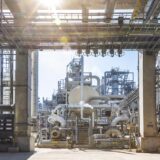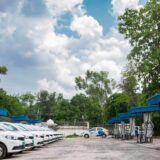
bp’s Gelsenkirchen refinery undergoes green transformation
bp has unveiled plans for a significant overhaul of its refinery operations in Gelsenkirchen, Germany, aimed at aligning the site with the burgeoning demands of the energy transition. The initiative seeks to enhance the refinery’s competitiveness by reducing complexity, cutting operational costs, and shifting towards the production of lower-emission and sustainable aviation fuels.
The transformation is driven by the dwindling demand for conventional fuels in Europe, coupled with a growing market for environmentally friendly alternatives. To navigate these changes, bp intends to decommission certain facilities within the refinery and, pending necessary approvals, repurpose others to accommodate biogenic materials alongside traditional inputs. This strategic shift is expected to slash the site’s CO2 emissions by up to 500,000 tons annually starting in 2026.
Arno Appel, the head of the Gelsenkirchen refinery, emphasized the urgency of the revamp. “Our refinery location in Gelsenkirchen is currently not competitive. We are too complex and – not only because of this – burdened with structural costs that are too high. In order to be able to take advantage of the opportunities that arise for our location from the energy transition, we have to change today. We want to give the Gelsenkirchen location a perspective and greater potential for its contributions to the energy transition.”
As part of the restructuring, five systems at the Horst and Scholven plants are slated for shutdown from 2025, potentially reducing the refinery’s total production capacity from 12 million tonnes of crude oil per year to about eight million tonnes. These adjustments aim to lower the site’s Scope 1 emissions significantly.
Furthermore, bp hopes to harness the potential of co-processing at its hydrocracker plant to produce sustainable aviation fuels (SAF), which could reduce life cycle CO2 emissions by up to 80% compared to conventional aviation fuel. The company is also exploring partnerships to establish a circular economy network within the refinery, further underscoring its commitment to sustainability.
The refinery’s evolution will inevitably lead to changes in job roles and potentially result in a reduction of the workforce. Appel acknowledged the challenges ahead, stating, “The tasks on site will change, and we are committed to making this transition as fair and socially responsible as possible by engaging with employee representatives promptly.”
The Gelsenkirchen site, comprising the Horst and Scholven plants, is a critical player in Germany’s fuel and energy supply, as well as the North Rhine-Westphalia chemical network. With around 2,000 employees and 160 trainees, the facility processes approximately 12 million tons of crude oil annually, producing a wide range of products for the chemical industry, in addition to gasoline, diesel, jet fuel and heating oil.
bp’s initiative in Gelsenkirchen is part of its broader ambition to become a net-zero emissions company by 2050 or sooner, highlighting its dedication to rethinking energy for a more sustainable future.













